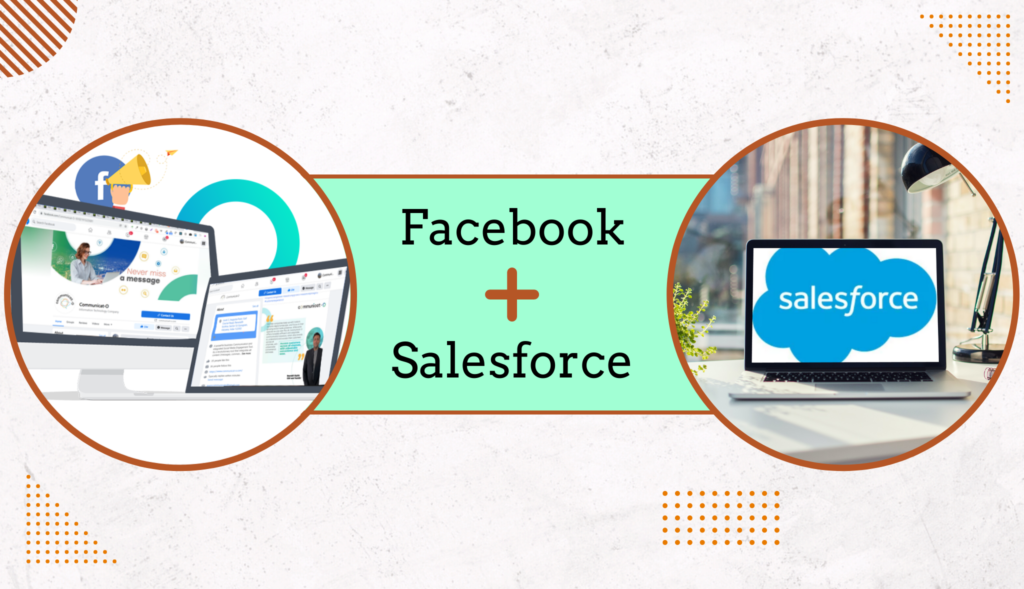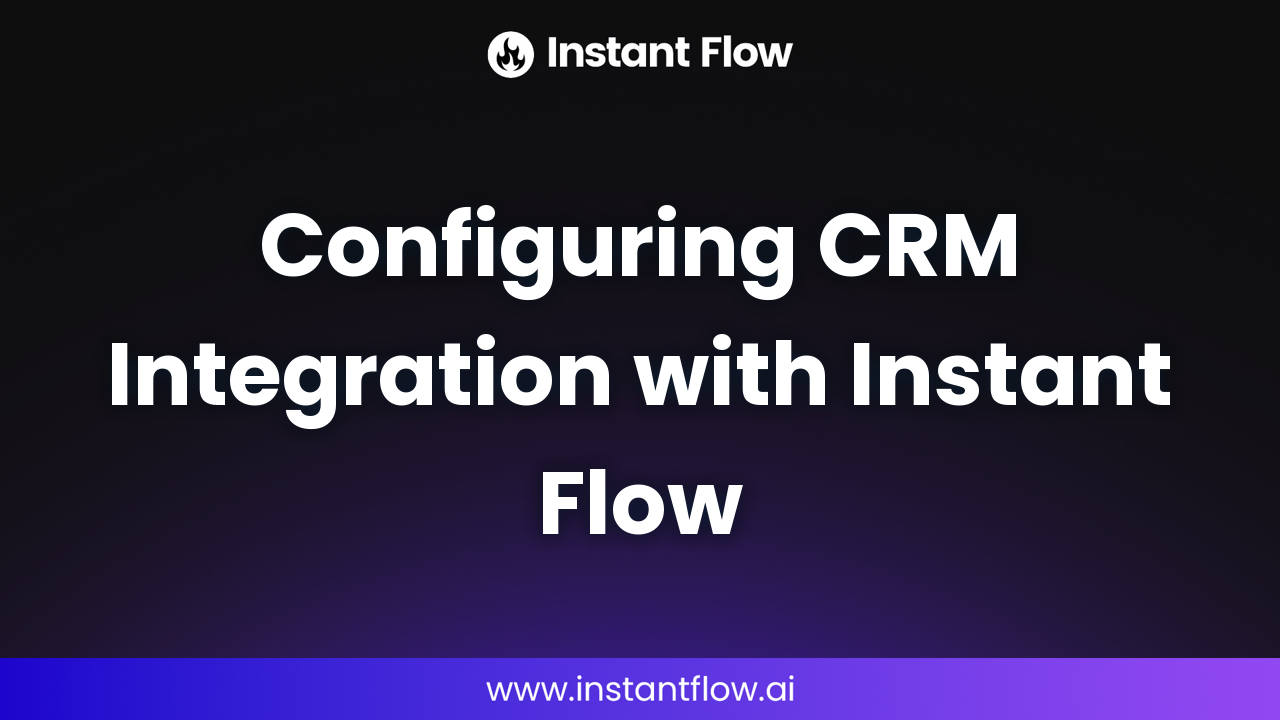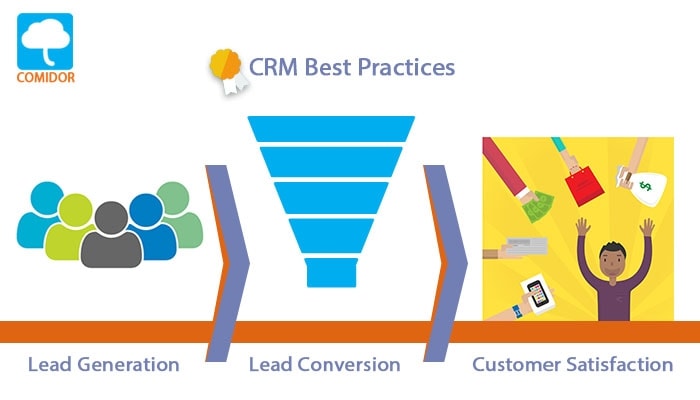Unlocking Social Commerce: A Deep Dive into CRM Integration with Facebook

Introduction: The Power of the Facebook-CRM Synergy
In today’s hyper-connected world, businesses are constantly seeking innovative ways to engage with their customers. Social media, particularly Facebook, has emerged as a pivotal platform for marketing, sales, and customer service. Simultaneously, Customer Relationship Management (CRM) systems have become indispensable tools for organizing customer data, streamlining workflows, and enhancing overall business efficiency. The integration of these two powerful entities – Facebook and CRM – represents a monumental opportunity for businesses to revolutionize their customer interactions and drive unprecedented growth. This article delves deep into the intricate world of CRM integration with Facebook, exploring its benefits, implementation strategies, and best practices to empower businesses to thrive in the digital landscape.
Understanding the Core Concepts: CRM and Facebook
What is CRM?
CRM, or Customer Relationship Management, is a technology that manages all your company’s relationships and interactions with customers and potential customers. The goal is simple: improve business relationships. A CRM system helps companies stay connected to customers, streamline processes, and improve profitability. When people talk about CRM, they’re usually referring to a CRM system—a tool that helps with contact management, sales management, productivity, and more. CRM systems consolidate customer information into a single view so you can better manage your customer relationships. Key functions include:
- Contact Management: Store and organize customer contact information, including phone numbers, email addresses, and social media profiles.
- Sales Automation: Automate sales processes, such as lead tracking, opportunity management, and quote generation.
- Marketing Automation: Automate marketing tasks, such as email campaigns, social media posting, and lead nurturing.
- Customer Service: Manage customer service inquiries, support tickets, and issue resolution.
- Analytics and Reporting: Generate reports and analyze data to track performance and identify areas for improvement.
What is Facebook?
Facebook, a social networking service, is a digital hub where billions of people connect, share, and interact. It’s a platform for personal and professional networking, enabling users to build relationships, share content, and participate in discussions. For businesses, Facebook is an invaluable marketing tool, offering a wide array of features and functionalities, including:
- Facebook Pages: Create a professional presence to showcase your brand, products, and services.
- Facebook Ads: Run targeted advertising campaigns to reach specific demographics and interests.
- Facebook Messenger: Communicate with customers in real-time, providing customer support and answering inquiries.
- Facebook Groups: Build communities around your brand, fostering engagement and loyalty.
- Facebook Marketplace: Sell products directly to customers within the platform.
The Benefits of CRM Integration with Facebook
Integrating your CRM with Facebook unlocks a plethora of benefits that can significantly impact your business performance. Here are some of the most compelling advantages:
Enhanced Customer Data
Integrating CRM with Facebook allows you to consolidate customer data from both platforms. This means you can capture valuable information from Facebook, such as:
- Facebook Profile Data: Capture customer profile information, including name, location, interests, and other demographic details.
- Interactions: Track customer interactions, such as likes, comments, shares, and messages.
- Purchase History: Integrate with e-commerce platforms to track customer purchases made through Facebook.
By combining this data with your existing CRM data, you gain a 360-degree view of your customers, enabling you to personalize interactions and provide tailored experiences.
Improved Lead Generation
Facebook is a goldmine for lead generation. CRM integration streamlines the process of capturing and nurturing leads generated through Facebook. You can:
- Capture Leads from Facebook Ads: Automatically import leads generated through Facebook lead generation forms directly into your CRM.
- Track Lead Interactions: Monitor lead interactions on Facebook, such as comments, messages, and page views.
- Nurture Leads with Targeted Campaigns: Create targeted marketing campaigns based on lead behavior and interests on Facebook.
Enhanced Customer Service
Integrating your CRM with Facebook Messenger allows you to provide seamless customer service. You can:
- Manage Customer Inquiries: Respond to customer inquiries and resolve issues directly through Facebook Messenger.
- Track Customer Interactions: Keep a record of all customer interactions, including messages, calls, and emails.
- Personalize Customer Service: Provide personalized support based on customer data and interaction history.
Streamlined Sales Processes
By integrating your CRM with Facebook, you can streamline your sales processes and close more deals. You can:
- Track Sales Opportunities: Monitor sales opportunities generated through Facebook, such as leads from Facebook ads or inquiries through Messenger.
- Manage Sales Pipelines: Use your CRM to manage your sales pipeline and track the progress of each deal.
- Automate Sales Tasks: Automate sales tasks, such as sending follow-up emails and scheduling appointments.
Increased Marketing ROI
CRM integration with Facebook allows you to optimize your marketing efforts and increase your return on investment (ROI). You can:
- Target Ads More Effectively: Use customer data from your CRM to target Facebook ads to the right audience.
- Track Campaign Performance: Track the performance of your Facebook marketing campaigns and measure their ROI.
- Personalize Marketing Messages: Personalize your marketing messages based on customer data and behavior on Facebook.
How to Integrate CRM with Facebook: Step-by-Step Guide
Integrating your CRM with Facebook can seem daunting, but with the right approach, it can be a smooth and rewarding process. Here’s a step-by-step guide to help you get started:
1. Choose the Right CRM and Integration Method
The first step is to choose a CRM system that offers robust Facebook integration capabilities. Consider factors such as:
- Features: Ensure the CRM supports the features you need, such as lead capture, contact synchronization, and customer service integration.
- Scalability: Choose a CRM that can scale with your business as it grows.
- Ease of Use: Select a CRM that is user-friendly and easy to implement.
- Integration Options: Determine the available integration methods, such as native integrations, third-party apps, or custom APIs.
There are several integration methods available, including:
- Native Integrations: Some CRM systems offer native integrations with Facebook, providing seamless data synchronization and workflow automation.
- Third-Party Apps: Numerous third-party apps and connectors provide integration between CRM and Facebook.
- Custom API Integration: For advanced users, custom API integration allows for greater flexibility and customization.
2. Connect Your CRM to Facebook
Once you’ve chosen your CRM and integration method, the next step is to connect your CRM to your Facebook account. This process typically involves:
- Authorizing the Connection: Granting your CRM access to your Facebook account by authorizing the connection.
- Configuring Settings: Configuring the settings to specify how data will be synchronized between the two platforms.
- Mapping Fields: Mapping the fields between your CRM and Facebook to ensure data is accurately transferred.
3. Configure Lead Capture
If you plan to generate leads through Facebook, you’ll need to configure lead capture settings. This typically involves:
- Setting up Lead Generation Forms: Create lead generation forms on Facebook to collect customer information.
- Connecting Forms to Your CRM: Connect your lead generation forms to your CRM to automatically import leads.
- Setting up Automation Rules: Configure automation rules to trigger actions, such as sending automated emails or assigning leads to sales representatives.
4. Set Up Customer Service Integration
To provide seamless customer service, you’ll need to integrate Facebook Messenger with your CRM. This typically involves:
- Connecting Messenger to Your CRM: Connect your Facebook Messenger account to your CRM.
- Configuring Routing Rules: Set up routing rules to direct customer inquiries to the appropriate support agents.
- Setting up Chatbots: Integrate chatbots to automate responses to common customer inquiries.
5. Test and Refine
After setting up your CRM integration with Facebook, it’s crucial to test the integration to ensure it’s working correctly. Test the following:
- Lead Capture: Test lead capture forms to ensure leads are being imported into your CRM.
- Data Synchronization: Verify that data is being synchronized correctly between your CRM and Facebook.
- Customer Service Integration: Test the customer service integration to ensure inquiries are being routed correctly.
Based on your testing results, refine your settings and workflows to optimize your integration.
Best Practices for Successful CRM Integration with Facebook
To maximize the benefits of CRM integration with Facebook, follow these best practices:
1. Define Clear Goals and Objectives
Before starting the integration process, define clear goals and objectives. What do you want to achieve with the integration? (e.g., increase lead generation, improve customer service, streamline sales processes). Having clear goals will help you choose the right CRM, set up the integration correctly, and measure your success.
2. Clean and Organize Your Data
Ensure your customer data in your CRM is clean, accurate, and organized. This will improve the accuracy of data synchronization and personalization efforts. Regularly review and update your data to maintain its integrity.
3. Personalize Your Interactions
Use the data from your CRM to personalize your interactions with customers on Facebook. Segment your audience, tailor your messages, and provide relevant content to improve engagement and drive conversions.
4. Automate Tasks and Workflows
Leverage automation features to streamline tasks and workflows. Automate lead capture, customer service responses, and sales follow-ups to save time and improve efficiency.
5. Train Your Team
Provide training to your team on how to use the integrated CRM and Facebook platform effectively. Ensure your team understands the features, functionalities, and best practices for using the integrated system.
6. Monitor and Analyze Your Results
Regularly monitor and analyze your results to measure the effectiveness of your CRM integration with Facebook. Track key metrics, such as lead generation, customer engagement, and sales conversions. Use the data to refine your strategies and improve your results.
7. Stay Updated
Keep up-to-date with the latest features, updates, and best practices for both your CRM and Facebook. This will help you optimize your integration and stay ahead of the competition.
Tools and Technologies for CRM Integration with Facebook
Several tools and technologies can facilitate CRM integration with Facebook. Here are some of the most popular:
CRM Systems
- Salesforce: A leading CRM platform with robust Facebook integration capabilities.
- HubSpot CRM: A popular CRM system that offers native Facebook integration and marketing automation features.
- Zoho CRM: A versatile CRM system that integrates with Facebook and other social media platforms.
- Microsoft Dynamics 365: A comprehensive CRM platform with powerful Facebook integration options.
- Pipedrive: A sales-focused CRM with a focus on ease of use and Facebook integration.
Integration Platforms
- Zapier: A popular integration platform that connects various apps, including CRM systems and Facebook.
- Make (formerly Integromat): A visual integration platform that allows you to automate complex workflows.
- PieSync by HubSpot: A two-way contact sync platform that synchronizes contacts between CRM and Facebook.
Facebook Marketing Tools
- Facebook Lead Ads: A native Facebook ad format that allows you to capture leads directly within Facebook.
- Facebook Pixel: A tracking pixel that allows you to track website conversions and retarget ads to website visitors.
- Facebook Business Manager: A platform for managing your Facebook business presence, including ads, pages, and permissions.
Challenges and Solutions
While CRM integration with Facebook offers numerous benefits, it also presents some challenges. Here are some common challenges and how to overcome them:
Data Privacy and Security
Challenge: Ensuring the privacy and security of customer data is paramount. You must comply with data privacy regulations, such as GDPR and CCPA.
Solution: Implement robust security measures, such as data encryption, access controls, and regular security audits. Obtain customer consent before collecting and using their data. Ensure you comply with all applicable data privacy regulations.
Data Synchronization Issues
Challenge: Data synchronization issues can arise, leading to inaccurate or incomplete data in your CRM or Facebook.
Solution: Choose a reliable integration method and regularly monitor data synchronization. Implement data validation rules to ensure data accuracy. Troubleshoot and resolve any synchronization issues promptly.
Complexity of Implementation
Challenge: Implementing CRM integration with Facebook can be complex, especially for businesses with limited technical expertise.
Solution: Choose a CRM system and integration method that is user-friendly and easy to implement. Consider hiring a consultant or using a third-party integration service to help with the implementation process.
Maintaining Data Quality
Challenge: Maintaining data quality requires ongoing effort to ensure data is accurate, complete, and up-to-date.
Solution: Implement data validation rules and regularly review and update your data. Train your team to follow data entry best practices. Implement a data governance policy to ensure data quality.
The Future of CRM Integration with Facebook
The integration of CRM systems with Facebook is a dynamic and evolving field. As technology advances, the possibilities for enhancing customer interactions and driving business growth will only continue to expand. Here are some trends shaping the future of CRM integration with Facebook:
- AI-Powered Personalization: Artificial intelligence (AI) will play an increasingly important role in personalizing customer experiences. AI-powered tools will analyze customer data to predict behavior and provide tailored recommendations.
- Enhanced Customer Service: Chatbots and AI-powered virtual assistants will become more sophisticated, providing instant customer support and resolving complex issues.
- Seamless E-commerce Integration: CRM systems will integrate more seamlessly with e-commerce platforms, enabling businesses to track customer purchases, manage orders, and personalize marketing efforts.
- Advanced Analytics and Reporting: CRM systems will provide more advanced analytics and reporting capabilities, allowing businesses to gain deeper insights into customer behavior and campaign performance.
- Increased Focus on Privacy and Security: Data privacy and security will remain a top priority. Businesses will need to implement robust security measures and comply with data privacy regulations to protect customer data.
Conclusion: Embrace the Synergy for Business Success
CRM integration with Facebook is no longer a luxury; it’s a necessity for businesses seeking to thrive in the competitive digital landscape. By consolidating customer data, streamlining processes, and personalizing interactions, businesses can create meaningful connections with their customers, drive sales, and foster long-term loyalty. By understanding the core concepts, embracing best practices, and leveraging the latest tools and technologies, businesses can unlock the full potential of this powerful synergy and achieve unprecedented success. The future of business lies in the seamless integration of customer relationship management and social media, and those who embrace this synergy will be best positioned to lead the way.




